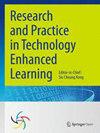利用游戏化对乳品公司配送人员进行店内分类培训
IF 3
Q1 EDUCATION & EDUCATIONAL RESEARCH
Research and Practice in Technology Enhanced Learning
Pub Date : 2023-03-07
DOI:10.58459/rptel.2023.18035
引用次数: 0
摘要
本研究的目的是为快速消费品经销商设计和实施一门使用游戏化的电子学习课程。在第一步中,使用系统的文献综述提取店内分类的组成部分,并将这些因素中的每个因素的客户偏好确定为387名客户的用户意见。接下来,基于劝导游戏设计(persuasive game design, PGD)模型设计游戏,由专家小组确定游戏的机制、动态和美学(MDA),并设计一款手机应用作为学习工具。在接下来的步骤中,设计好的游戏由经销商进行,并将游戏奖品颁发给获胜者。最后,通过IMI问卷和玩家积分分析,对游戏化电子学习的效果进行了评价。调查结果显示,课程的乐趣、感知能力、努力重要性、压力张力、感知选择和有用性显著高于平均水平。此外,在重复回合中,平均得分越来越高,而分数的分散程度越来越低。因此,游戏化似乎是营销人员(尤其是分销商)学习运营技巧的一个有价值的选择。本文章由计算机程序翻译,如有差异,请以英文原文为准。
In-store assortment training to the distribution manpower of dairy companies using gamification
The aim of this study is to design and implement an e-learning course for distributors of fast-moving consumer goods using gamification. In the first step, the components of the in-store assortment are extracted using a systematic literature review, and customer preferences in each of these factors were determined as users’ opinions of 387 customers. In the next step, the game is designed based on the persuasive game design (PGD) model, and the mechanics, dynamics, and aesthetics (MDA) of the game were determined by an experts’ panel, and a mobile app is designed as a learning tool. In the following step, the designed game was carried out by the distributors and the game prizes are awarded to the winners. Finally, the effects of the gamified e-learning are evaluated using the IMI questionnaire and analyzing the players’ points. Findings show that enjoyment, perceived competence, effort importance, pressure tension, perceived choice, and usefulness of this course are significantly higher than average. Besides, the average of points gets higher during repetition rounds while the dispersion of the points gets lower. As a result, it seems that gamification could be a valuable alternative to learning operational tricks for marketing staff, especially distributors.
求助全文
通过发布文献求助,成功后即可免费获取论文全文。
去求助
来源期刊

Research and Practice in Technology Enhanced Learning
Social Sciences-Education
CiteScore
7.10
自引率
3.10%
发文量
28
审稿时长
13 weeks
 求助内容:
求助内容: 应助结果提醒方式:
应助结果提醒方式:


